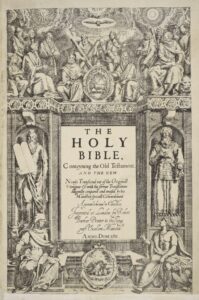Copyright
 How long does a copyright last?
How long does a copyright last?
The term of copyright for a particular work depends on several factors, including whether it has been published, and, if so, the date of first publication. As a general rule, for works created after January 1, 1978, copyright protection lasts for the life of the author plus an additional 70 years. For an anonymous work, a pseudonymous work, or a work made for hire, the copyright endures for a term of 95 years from the year of its first publication or a term of 120 years from the year of its creation, whichever expires first. For works first published prior to 1978, the term will vary depending on several factors. To determine the length of copyright protection for a particular work, consult chapter 3 of the Copyright Act (title 17 of the United States Code). More information on the term of copyright can be found in Circular 15a, Duration of Copyright, and Circular 1, Copyright Basics.
Authorized King James Bible – The Holy Bible
Since the AKJB was first published in 1611, if it had any copyright it would have expired and become public domain. And no new copyright can be issued.
The AKJB was originally published in England with “Cum Privilegio” printed on it, this literally means “with privilege” or “right” it is believed to indicate it was published under a royal licence also called a “Crown Copyright”. This gave the appointed royal printers the right to publish the AKJB, but it has been historically documented that they did not excercise this right even in the first 100 years, therefore it can be assumed if not otherwise stated that the crown copyright though asserted the rights are waived to ensure wide access and dissemination of the material. As is much of the material under a crown copyright.
In the U.K the “Crown Copyright” of the Bible was often considered perpetual. So if it is applicable today this licence would only apply to Bible publishers in the United Kingdom if the rights have not been waived. That is why the Authorized King James Bible is classed internationally as public domain.
If your AKJB has maps or notes, then it may have a copyright, but the text itself does not, since for a writing to become copyright it must be “substanially different” to any existing public domain or copyrighted material.
“To be copyrightable, a derivative work must be different enough from the original to be regarded as a ‘new work’ or must contain a substantial amount of new material. Making minor changes or additions of little substance to a pre-existing work will not qualify the work as a new version for copyright purposes.” –The Derivative Copyright Law (partial).
Do not by confused with the The New King James Bible (NKJV) Which is copyrighted by Thomas Nelson Publishers. The NKJV is not a revision of the AKJB, replacing archaic words for this is not enough difference from the original AKJB to make the NKJV copyrightable. The NKJV is not even based on the same original manuscripts, it is a completely new translation with almost 60,000 word and textual differences. In the Authorized King James Bible (AKJB) there are only a couple of hundred words currently not used in English (wot, wist, etc), or words that have changed meaning.
